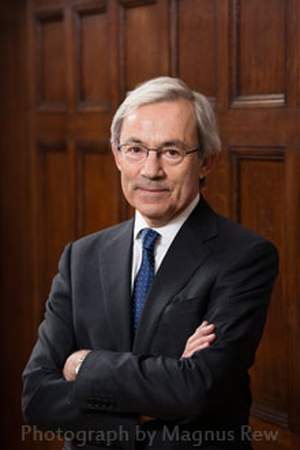Christopher A. Pissarides Biography
Sir Christopher Antoniou Pissarides FBA (/ˌpɪsəˈriːdiːz/; Greek: Χριστόφορος Αντωνίου Πισσαρίδης; born 20 February 1948) is a Cypriot economist. He is Regius Professor of Economics at the London School of Economics, and Professor of European Studies at the University of Cyprus. His research focuses on macroeconomics, labour economics, economic growth, and economic policy. In 2010, along with Peter Diamond and Dale Mortensen, he received the Nobel Prize in Economics, "for their *ysis of markets with theory of search frictions."
Early life
Pissarides was born in Nicosia, Cyprus, into a Greek Orthodox family from the village of Agros. He first studied at the Pancyprian Gymnasium in Nicosia. After national service in the Cypriot National Guard, he attended the University of Essex, where he received undergraduate and graduate degrees in economics, before studying at the London School of Economics, where he received a PhD in economics, writing a thesis *led Individual behaviour in markets with imperfect information under the supervision of Michio Morishima.
Career
Pissarides is Regius Professor of Economics at the London School of Economics, where he has taught since 1976. He is chairman of the Centre for Macroeconomics, which deploys economists from the University of Cambridge, the London School of Economics, the University College London, the Bank of England, and the National Ins*ute of Economic and Social Research.
He has held a lectureship at the University of Southampton (1974–76), and visiting professorships at Harvard University (1979–80) and the University of California, Berkeley (1990–91).
He served as the chairman of the National Economy Council of the Republic of Cyprus during the country's financial crisis in 2012, and resigned to focus on his academic work at the end of 2014.
In 2018, in collaboration with Naomi Climer and Anna Thomas, he set up the Ins*ute for the Future of Work, a London-based research and development ins*ute exploring how new technologies transform work and working lives.
In February 2020, Greek prime minister Kyriakos Mitsotakis appointed Pissarides to the chairmanship of a committee tasked with drafting a long-term growth strategy for the country. Since September 2020 he is chairman of the economic council of EuroAfrica Interconnector.
In June 2021, it was announced that he would lead a review into the future of work and wellbeing, a three-year collaboration between the Ins*ute for the Future of Work, Imperial College London, and Warwick Business School, funded by a £1.8 million grant from the Nuffield Foundation. The Pissarides Review into the Future of Work and Wellbeing was launched in March 2022.
Academic contributions
Pissarides is credited with contributions to the search and matching theory for studying the interactions between the labour market and the macroeconomy. He helped develop the concept of the matching function (explaining the flows from unemployment to employment at a given moment of time) and pioneered the empirical work on its estimation. Pissarides has also done research on structural change and growth.
One of his papers, "Job Creation and Job Destruction in the Theory of Unemployment" (with Dale Mortensen), was published in the Review of Economic Studies in 1994.
Pissarides' book Equilibrium Unemployment Theory, a study of the macroeconomics of unemployment, is now in its second edition and was revised after his joint work with Mortensen resulted in the *ysis of both endogenous job creation and destruction.
Awards and honours
- Fellow of the Econometric Society, 1997
- Fellow of the British Academy, 2002
- Fellow of the European Economic *ociation, 2005
- IZA Prize in Labor Economics, jointly with Dale Mortensen, 2005
- Foreign Honorary Member of the American Economic *ociation, 2011
- Vice-president of the European Economic *ociation, President in 2011
- Nobel Prize in Economics in 2010, jointly with Dale Mortensen, Peter A. Diamond, for "*ysis of markets with search frictions"
- The College Historical Society of Trinity College Dublin awarded Pissarides its Gold Medal for Outstanding Contribution to Public Discourse in 2012
- In 2013, Knighted in the 2013 Birthday Honours for "services to economics."
- Member of the Academy of Athens, 2015
Selected works
Nobel Prize laureates press conference at the KVA, 2010- Pissarides, C. A. (1979). "Job Matchings with State Employment Agencies and Random Search". Economic Journal. 89 (356): 818–833. doi:10.2307/2231501. JSTOR:2231501.
- Pissarides, Christopher A. (1985). "Short-Run Equilibrium Dynamics of Unemployment, Vacancies, and Real Wages". American Economic Review. 75 (4): 676–690. JSTOR:1821347.
- Pissarides, Christopher; Layard, Richard; Hellwig, Martin (1986). "Unemployment and Vacancies in Britain". Economic Policy. 1 (3): 499–559. doi:10.2307/1344583. JSTOR:1344583.
- Mortensen, D. T.; Pissarides, C. A. (1994). "Job Creation and Job Destruction in the Theory of Unemployment". Review of Economic Studies. 61 (3). (with Dale Mortensen): 397–415. doi:10.2307/2297896. JSTOR:2297896.
- Equilibrium Unemployment Theory (Second:ed.). Cambridge, MA: MIT Press. 2000. ISBN:978-0-262-16187-9. Description and chapter-preview links.
- Ngai, L. Rachel; Pissarides, Christopher A. (2007). "Structural Change in a Multi-Sector Model of Growth" (PDF). American Economic Review. 97 (1). (with L. Rachel Ngai): 429–443. doi:10.1257/aer.97.1.429. JSTOR:30034402. S2CID:14126725. Archived from the original (PDF) on 17 July 2012.
References
External links
- Christopher A Pissarides personal page at London School of Economics
- Christopher Pissarides' personal website
- Christopher A. Pissarides on Nobelprize.org including the Nobel lecture on 8 December 2010 Equilibrium in the Labour Market with Search Frictions
- Profile and Papers at Research Papers in Economics/RePEc
- Christopher Pissarides Archived 24 September 2015 at the Wayback Machine commemorative postage stamp issued from the Cyprus Post Office, 8 June 2011
